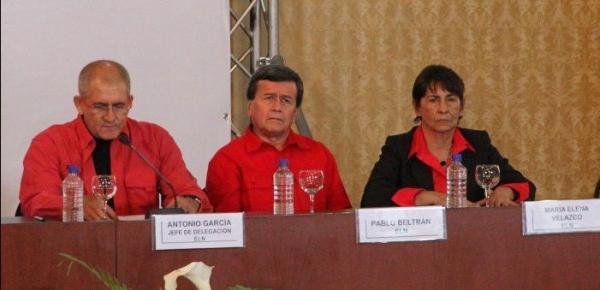Colombia's National Liberation Army, or ELN, rebel group and the Colombian government under President Juan Manuel Santos will hold peace negotiations beginning on Oct. 27 in Ecuador. The ELN, whose leadership is seen here during exploratory peace negotiations earlier this year, was to have formal peace talks with the government in March, but talks were delayed because the group did not meet the government's demand its rebels stop kidnapping people. Photo courtesy of ELN-Paz
CARACAS, Venezuela, Oct. 11 (UPI) -- The Colombian government under President Juan Manuel Santos and the National Liberation Army, or ELN, rebel group have agreed to hold peace talks following the recent rejection of a deal with the FARC.
Both sides, which met in Caracas, Venezuela, to announce the negotiations, will meet in Ecuador's capital of Quito on Oct. 27.
"Today we do not start from zero, we continue unabated because the only way for Colombia is the peace that involves and represents all," the ELN's peace delegation said in a statement, adding that their aim is to hold national talks seeking "peace with social justice."
The ELN, like the FARC, or Revolutionary Armed Forces of Colombia, began as a Marxist-inspired insurgency in the 1960s. It was never as large or as powerful as the FARC, but like the FARC its members engaged in drug-trafficking, kidnapping and other illegal activity to fund their campaign against the government.
There are an estimated 2,500 ELN rebels living mostly in Colombia's rural, mountainous areas. The ELN and Santo's administration previously suspended peace talks over the issue of kidnappings and hostages.
Santos said no meetings would be held with the ELN until kidnappings ceased and all hostages were freed. The ELN said the issue of hostages should have been part of the negotiations.
In the past two weeks, the ELN released three hostages -- including a rice farmer kidnapped three months ago who on Monday was freed near Colombia's border with Venezuela. The ELN said they would release two others before peace talks are held later this month.
The release of some hostages helped both sides reach an agreement to begin holding peace negotiations in Ecuador. In a national vote held Oct. 2, Colombians voted to reject a peace deal with the FARC rebel group. President Alvaro Uribe, the leader of the "No" campaign, formerly thought the terms were too lenient in favor of the FARC.
"No" wants FARC rebels found guilty of crimes to be banned from running for public office, FARC leaders to serve time in prison for crimes committed and that the FARC use their illegally acquired funds to pay for compensation for victims.
"We will continue to listen to spokesmen of 'No.' Dialogue must be grounded in realism and truth, not impossible proposals," Santos said in a statement after the ELN talks were announced. "We move towards a comprehensive peace."
Santos said it was "essential" the ELN released hostages, adding that there should "never be more kidnappings by this guerilla in Colombia."
More than 220,000 people have died and about 5 million have been internally displaced due to the Colombian conflict primarily attributed to the FARC since its founding in 1964.
Santos was recently awarded the 2016 Nobel Peace Prize for his efforts to end Colombia's 52-year conflict. Santos said negotiations with the ELN will not take into account the FARC deal and its rejection.















